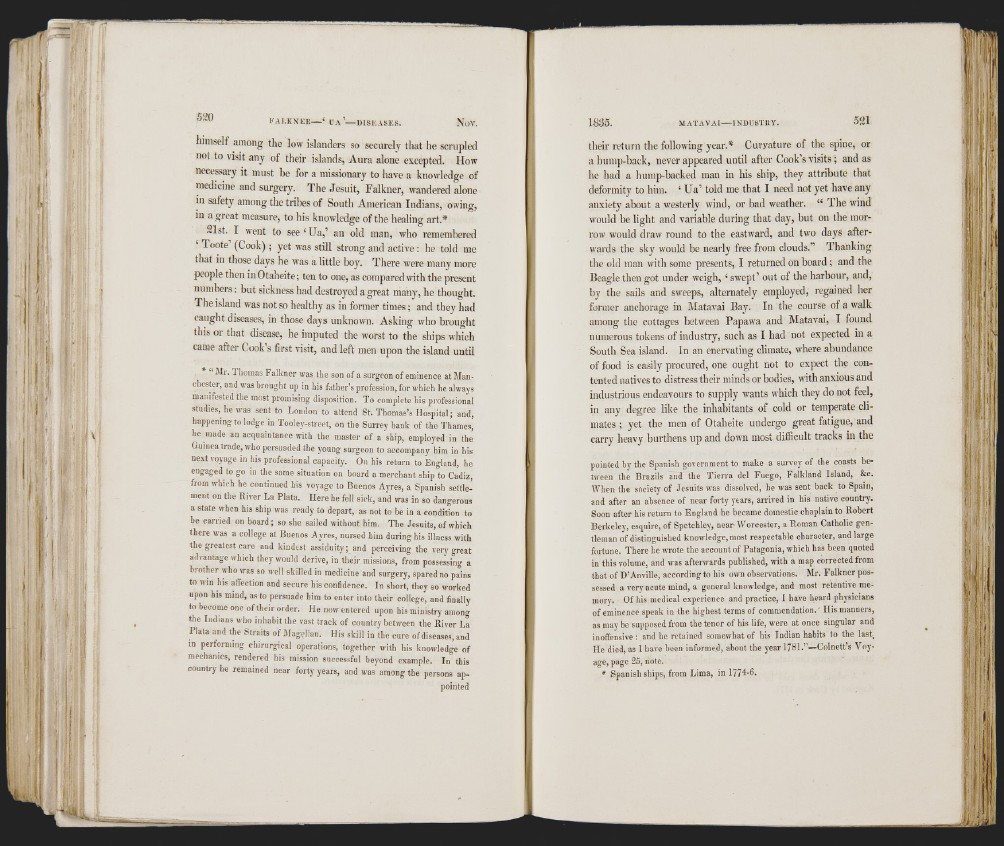
himself among the low islanders so securely that he scrupled
not to visit any of their islands, Aura alone excepted. How
necessary it must be for a missionary to have a knowledge of
medicine and surgery. The Jesuit, Falkner, wandered alone
in safety among the tribes of South American Indians, o wing,
in a great measure, to his knowledge of the healing art.*
21st. I went to see ‘ Ua,’ an old man, who remembered
‘ 1 oote’ (Cook) ; yet was still strong and active: he told me
that in those days he was a little boy. There were many more
people then in Otaheite; ten to one, as compared with the present
numbei’s : but sickness had destroyed a great many, he thought.
T. he island was not so healthy as in former times; and they had
caught diseases, in those days unknown. Asking who brought
this or that disease, he imputed the worst to the ships which
came after Cook’s first visit, and left men upon the island until
“ Mr. 1 homas Falkner was the son of a surgeon of eminence at Manchester,
and was brought up in his father’s profession, for which he always
manifested the most promising disposition. To complete his professional
studies, he was sent to London to attend St. Thomas’s Hospital; and,
happening to lodge in Tooiey-street, on the Surrey bank of the Thames,
he made an acquaintance with the master of a'ship, employed in the
Guiuea trade, who persuaded the young surgeon to accompany him in his
next voyage in his professional capacity. On his return to England, ho
engaged to go in the same situation on board a merchant ship to Cadiz,
from which he continued his voyage to Buenos Ayres, a Spanish seftlel
ment on the River La Plata. Here he fell sick, and was in so dangerous
a state when his ship was ready to depart, as not to be in a condition to
be carried on board; so she sailed without him. The Jesuits, of which
there was a college at Buenos A yres, nursed him during his illness with
the greatc.st care and kindest assiduity; and perceiving the very great
advantage which they would derive, in their missions, from possessing a
brother who was so well skilled in medicine and surgery, spared no pains
to win his affection and secure his confidence. In short, they so worked
upon his mind, as to persuade him to enter into their college, and finally
to become one of their order. He now entered upon his ministry among
the Indians who inhabit the vast track of country between the River La
Plata and the Straits of Magdlan. His skill in the cure of diseases, and
tn performing chirurgical operations, together with his knowledge of
mechanics, rendered his mission successful beyond example. In this
country he remained near forty years, and was among the persons appointed
their return the following year.* Curvature of the spine, or
a hump-back, never appeared until after Cook’s visits ; and as
he had a hump-backed man in his ship, they attribute that
deformity to him. ‘ Ua’ told me that I need not yet have any
anxiety ahout a westerly wind, or bad weather. “ The wind
would be light and variable during that day, but on the morrow
would draw round to the eastward, and two days afterwards
the sky would be nearly free from clouds.” Thanking
the old man with some presents, I returned on board; and the
Beagle then got under weigh, ‘ swept’ out of the harbour, and,
hy the sails and sweeps, alternately employed, regained her
former anchorage in Matavai Bay. In the course of a walk
among the cottages between Papawa and Matavai, I found
numerous tokens of industry, such as I had not expected in a
South Sea island. In an enervating climate, where abundance
of food is easily procured, one ought not to expect the contented
natives to distress their minds or bodies, with anxious and
industrious endeavours to supply wants which they do not feel,
in any degree like the inhabitants of cold or temperate climates
; yet the men of Otaheite undergo great fatigue, and
carry heavy burthens up and down most difficult tracks in the
pointed hy the Spanish government to make a survey of the coasts between
the Brazils and the Tierra del Fuego, Falkland Island, &c.
When the society of Jesuits was dissolved, he was sent back to Spain,
and after an absence of near forty years, arrived in his native country.
Soon after his return to England he became domestic chaplain to Robert
Berkeley, esquire, of Spetchley, near Worcester, a Roman Catholic gentleman
of distinguished knowledge, most respectable character, and large
fortune. There he wrote the account of Patagonia, which has been quoted
in this volume, and was afterwards published, with a map corrected from
that of D’Anville, according to his own observations. Mr. Falkner possessed
a very acute mind, a general knowledge, and most retentive memory.
Of his medical experience and practice, I have heard physicians
of eminence speak in the highest terms of commendation.' His manners,
as may be supposed from the tenor of his life, were at once singular and
inoffensive : and he retained somewhat of his Indian hahits to the last.
He died, as 1 have been informed, ahout the year 1781.”—Colnett’s Voy-
age, page 25, note.
* Spanish ships, from Lima, in 1774-6.
i | » |